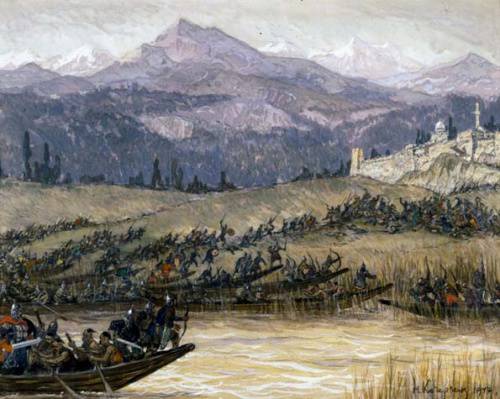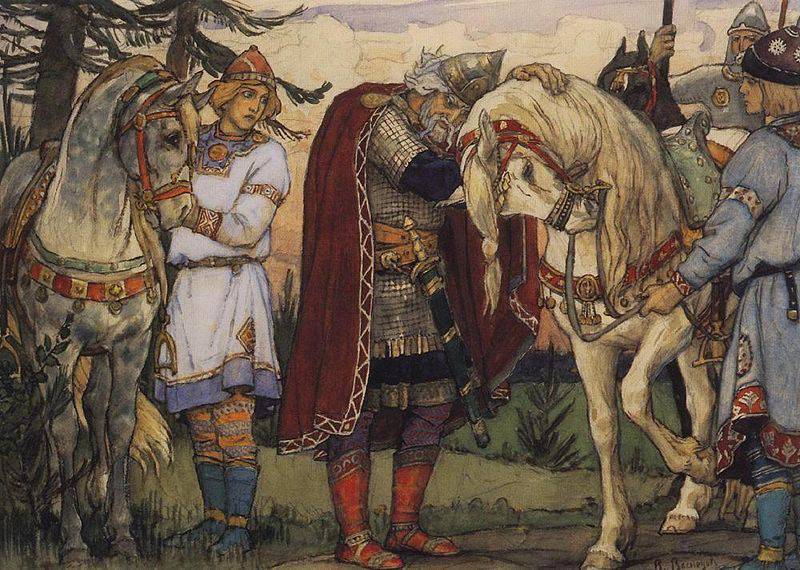Caspian campaign Rus 912 year
We learn about this campaign from the mouth of a noble Arab, a resident of Baghdad al Masoudi. He received an excellent education, made a trip to all the vast lands of the Muslim world: from the Cordoba emir, North Africa to conquered Armenia, Persia, fabulous India. There is a version that Al Masoudi visited in China. Following the results of his travels, he wrote 20 books (some of them consisted of several volumes), unfortunately, only two books have survived from all this wealth (the outline of two essays, The Chronicle and The Middle Book, 2) "Book of warnings and revisions").
The campaign of 912 is reported in the compendium; according to Masudi, the Russian army on 500 boats (they could hold 40-100 soldiers) asked permission from the Khagan-bek of Khazaria to go into the Caspian Sea. In exchange, they promised to give half of the booty upon return, that is, the reason that prompted such an army to go on campaigns was good, they were ready to give the Khazars a huge share. Relations at that time between Russia and Khazaria were tense: Oleg the Prophet released from the Khazars the land of the Vyatichi, Radimichi, and northerners. Khazaria, in response, declared a blockade of Rus trade with southern countries, Russian and Muslim merchants had to bypass, through the lands of the Volga Bulgaria. But the Khazars did not dare to fight directly, Oleg’s soldiers beat them more than once, therefore they could not immediately fight, without preliminary preparation, with such a strong army. Kagan-bek gave permission for passage flotilla Russ.
We don’t know the exact route, we can only assume that they immediately descended down the Volga to the Caspian Sea or, according to Masoudi, from the Sea of Azov (where they could come along the Dnieper – Black Sea route) they climbed the Don, crossed into the Volga and through the capital of Khazaria - Itil - entered the Caspian Sea.
Reason for the trip
The Ruses not only traded with the land adjacent to the Caspian Sea, but coastal cities and settlements were also robbed. Thus, in the 909 year, 16 of the Rooks landed a detachment on the island of Abeskun in the Astrabad Gulf, the settlements of the island were looted. In 910, the Ruses burned the city of Sari in Mazandaran (Persia), the inhabitants were stolen. As a result, the locals attacked a merchant caravan of Rus that had spent the night at the shore. There were those who found them, or it was a different unit, unknown. The caravan was destroyed, those rooks who were able to escape from the coast into the sea, met and destroyed the flotilla of the ruler of the Transcaucasian state Shirvan Shirvanshah Ali ibn al Gaitam.
The Ruses at that period of history did not differ in humility and mercy, therefore they had to answer for Russian blood with their own blood. As the anonymous author of 1126's History Collection wrote of the year, these stories belonged to earlier times: “... if someone sheds the blood of the Rus, they will not rest until they take revenge. And if you give them the whole world, they still will not back down from this. ”
Revenge
The Rus fell on the shores of the Caspian Sea, like the wrath of their god of war Perun - they were attacked by Jill, Deylem, the city of Tabaristan, Abeskun Island, the territory of modern Azerbaijan - “Oil Country”, and attacked Ardebil. Local residents could not provide decent resistance - the troops of the Arab governor in Armenia and Azerbaijan of Inb-Abis Saj were defeated, the Rustai detachments of the Dalimits (highlanders from the southern shores of the sea) were defeated. Blood was shed everywhere, the resistance was ruthlessly suppressed, the stolen goods and the prisoners were taken to the islands off the coast of the Oil Country.
Shirvanshah Ali Ibn al Ghaitam with his flotilla, reinforced by merchant ships with volunteers, tried to strike back, but the whole fleet, together with the Shirvanshah himself, went to the bottom - to feed the fish. The Rus did not leave after the first victories - for several months they were the complete masters of these lands. The rooks, full of stolen goods and prisoners, moved back.

The last battle of Russian teams
The Khazar elite wanted revenge for their previous defeats, and they wanted to take all the booty, not just half. The rulers of the Khazaria could not immediately destroy the Russian squad; the army of the Rus was too strong. They let them into the Caspian Sea and prepared a deadly trap: the way back was blocked by troops pulled from Khazaria, including the Muslim al-Arsiyan guard, the armor cavalry - archers and spearmen. They threw into battle and the city militia - Muslims, seething with a thirst for revenge for the ruined brothers in the faith.
The Rus did not disgrace their honor and took an unequal battle; it lasted for three days, and the river turned red with the blood of many dead. The Khazars did not receive captured prisoners - who died in battle, who drowned, according to the Khazars, only 30 thousand died, but about 5 thousand Rus broke out of the death ring up the river. They threw the court and tried to leave land, but the rest of the troops were destroyed by the allies of the Khazars (or, rather, vassals) - by the Burtases and the army of Bulgaria. It is clear that the figures of the Russian forces were likely exaggerated, but still it was a terrible blow to Russia, and when the army of Svyatoslav went to the Khazar kanagat, you can be sure that they will remember this bloody battle, the mean betrayal of the Khazar rulers who violated your word. What does this lesson teach? Do not believe the enemies!
There is a version that it was in this terrible battle that the Grand Duke of Russia, Oleg the Prophet, died. This is consonant with the symbolism of A. S. Pushkin:
From the dead head of the grave serpent,
Hissing, meanwhile crawled out;
Like a black ribbon, she wound herself round her legs,
And the prince suddenly cried out.
The Russian genius at the very beginning of "Song of the Wise Oleg" voiced the reason for the hatred of the Khazars for Oleg: "Their villages and fields for a violent raid He doomed swords and fires." According to another version, according to S. E. Tsvetkov and V. V. Kozhinov, the son of Oleg the Thing died - a kind of prince Oleg II.

Sources of:
Kozhinov V.V. The history of Russia and the Russian word. M., 2001.
Prozorov L. The Caucasian Frontier of Rus. M., 2011.
Tsvetkov S. E. Russian history. Prince 1. M., 2003.
http://www.vostlit.info/Texts/Dokumenty/Russ/X/Garkavi_mus_pis/11.htm
http://www.rvb.ru/pushkin/01text/01versus/0217_22/1822/0127.htm
Information